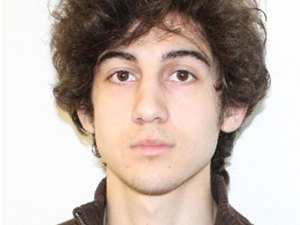- Dettagli
- Categoria: Death Penalty News
- Pubblicato: 04 Febbraio 2014
 |
| Dzhokhar Tsarnaev |
When accused Boston Marathon bomber Dzhokhar Tsarnaev is brought to trial later this year or early next, the life of the 20-year-old naturalized citizen won’t be the only thing at stake. In a very real way, the future of the death penalty—a barbaric relic of a bygone era abolished by more than two-thirds of the world’s nations—will also be on trial.
Legally, the decision to pursue execution was made by Attorney General Eric Holder. At Holder’s instruction, the U.S. Attorney’s Office for the District of Massachusetts filed a detailed eight-page Notice of Intent to Seek the Death Penalty on Jan. 30.
In the broadest sense, there are at least two reasons for Holder’s decision: First, the political backdrop of the continuing war on terror makes it imperative that the Obama administration appear strong in the face of danger.
Of course, there’s no explicit reference either to the president or the “war on terror” in the Notice of Intent. But the word “terrorism” appears in the document six times. The Notice recounts that Tsarnaev (who was born in Kyrgyzstan and whose family hails from Chechnya) “received asylum from the United States; obtained citizenship and enjoyed the freedoms of a United States citizen; and then betrayed his allegiance to the United States by killing and maiming people in the United States,” crimes the document characterizes as acts of “terrorism” rather than simply acts of murder, mayhem or aggravated assault. We are urged not only to condemn Tsarnaev but also to fear him.
There is nothing particularly unusual about the politics of fear being invoked in debates about the death penalty or street crime, generally. The politics of fear have driven our per capita incarceration rates to the highest in the world and left the United States as one of the leaders in the number of annual executions, trailing in recent years only such stalwarts of freedom and democracy as China, Iran, Iraq and Saudi Arabia, according to Amnesty International.
The politics of fear have also made and broken political careers in this country, consigning 1988 Democratic presidential candidate Michael Dukakis to a humiliating defeat to George H.W. Bush after a Republican PAC ran a television attack ad about a weekend prison furlough Dukakis supposedly approved as governor of Massachusetts for convicted murderer Willie Horton. By contrast, the execution statistics racked up by George W. Bush while governor of Texas bolstered his tough-on-crime image and helped pave his way to the White House.
The capital case against Tsarnaev offers more of the same politics, except with foreign or foreign-born terrorists replacing marauding racial minorities like Horton, an African-American, as the fearsome malefactors.
By Bill Blum, Truthdig, Feb. 3, 2014. Bill Blum is a former judge and death penalty defense attorney. He is the author of three legal thrillers published by Penguin/Putnam (“Prejudicial Error,” “The Last Appeal” and “The Face of Justice”) and is a contributing writer for California Lawyer magazine. His nonfiction work has appeared in such publications as Crawdaddy magazine, In These Times, The Nation, The Progressive, the ABA Journal, the Orange County Register, the San Jose Mercury News, the Los Angeles Times, LA Weekly and Los Angeles magazine.
Leggi tutto... http://deathpenaltynews.blogspot.com/2014/02/dzhokhar-tsarnaev-and-future-of-death.html








